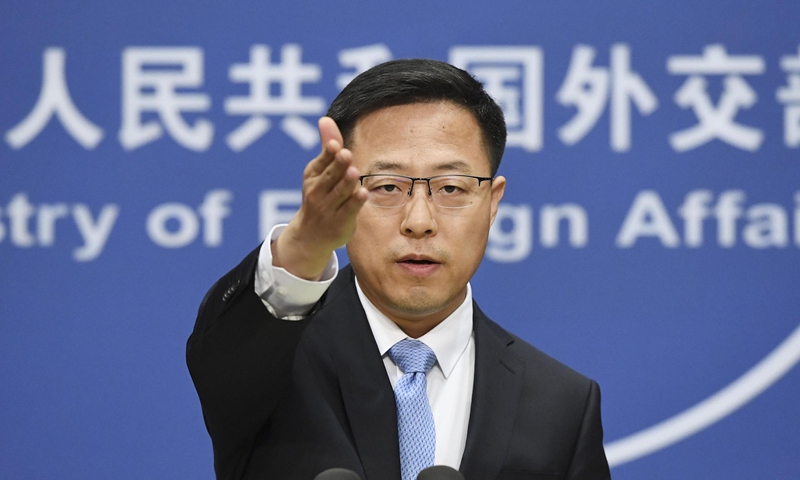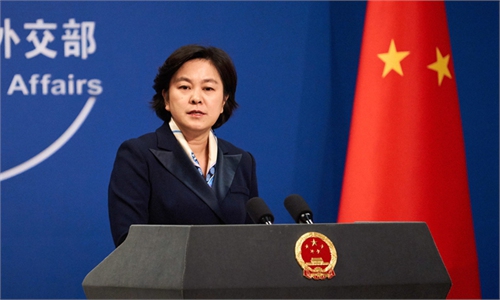
Chinese Foreign Ministry spokesperson Zhao Lijian. Photo: VCG
The Chinese Foreign Ministry slammed the US State Department spokesperson for calling so-called visa limitations on US media in China as a "reciprocal" move against the Trump administration's suppression of Chinese journalists in the US, calling it totally groundless and saying the US is blaming others when it should be blaming itself.
Chinese Foreign Ministry spokesperson Zhao Lijian made the comments at a routine press conference on Monday. He pointed out that press credential extension applications for journalists with US media outlets, including CNN, are being processed, for them to continue to live and work in China. "And we have informed the US on the matter."
The spokesperson's remarks came after a CNN report on Sunday painted a false picture that Beijing is cutting what normally is a year-long visa extension for journalists with US media working in China to only two months. The report cited David Stilwell, the US State Department's Assistant Secretary for East Asia and Pacific Affairs, who called it a "reciprocal measure" to the Trump administration's treatment of Chinese journalists in the US.
The US has come to a "hysteria" state of mind, constantly increasing political suppression against Chinese media, Zhao said.
On August 6, the visas of all Chinese journalists expired. They followed the US requirement, and applied for an extension in advance. However, none of them have received a specific answer from the authorities, which seriously disrupts their legitimate work in the US, impairs Chinese media's reputation, and jeopardizes normal exchanges between the two countries, Zhao said.
Zhao also said that since 2018, about 30 Chinese journalists have had such an experience. In March, the US, in effect, expelled 60 Chinese journalists. On May 11, the US announced that visas for Chinese journalists are only good for 90 days starting from May 8.
The US is biased in its treatment of Chinese media, and takes Chinese journalists in the US as hostages, while flaunting freedom of the press, which reflects double standards and hegemonic bullying tactics. Despite that, China adheres to communication and negotiations with the US under the premise of equality and mutual respect, to solve the media issue between the two countries, Zhao noted.
China has been restrained on taking countermeasures, and working on extending the visas of US journalists, and offering convenience for their work. China did not expel the same number of US journalists when the US expelled 60 Chinese journalists and denied visas for more than 20, he said.
Li Haidong, a professor at the Institute of International Relations at the China Foreign Affairs University, told the Global Times on Monday that it is the US that unilaterally created the media crackdown, and that it is irresponsible for the US State Department or media to scapegoat China for such a dilemma.
China has been displaying calm and rationality when it comes to handling bilateral ties with the US, drawing a big contrast to the US stance that is increasingly reckless and impulsive, Li noted.
The US acted arrogant during the communication with China, turned a deaf ear to China's legitimate concerns and requests, coerced China with the visa extensions for Chinese journalists, and held Chinese reporters as hostages to pressure China, Zhao said. "China will not compromise on that."
US journalists in China are clear on the said facts, and do not support the US government's crackdown on Chinese media and using media from the two countries as pawns, Zhao said.
If Washington truly cares about American journalists, it should approve the visa extensions of all Chinese journalists, rather than hold journalists as hostages for the political interests of certain politicians.
Zhao urged the US to meet China halfway and respond to China's reasonable requests as soon as possible, warning that "The US understands very well that China has all the options on the table. If the US keeps moving further down the wrong path, China will have no choice but to make a justifiable and necessary reaction to firmly uphold its legitimate rights."
In several tweets on Monday afternoon, Hua Chunying, Chinese Foreign Ministry spokesperson, also made it clear that "We would be glad to continue our excellent cooperation with American journalists here if Chinese journalists are treated fairly in the US."
Hua urged the US State Department in a tweet to "be honest to tell people that since 2018, the StateDept has delayed&denied visas to about 30 Chinese journalists&expelled 60 in Mar, limited the visas of all Chinese journalists to a max 90-day stay in May&has not approved a visa extension to any of them."


